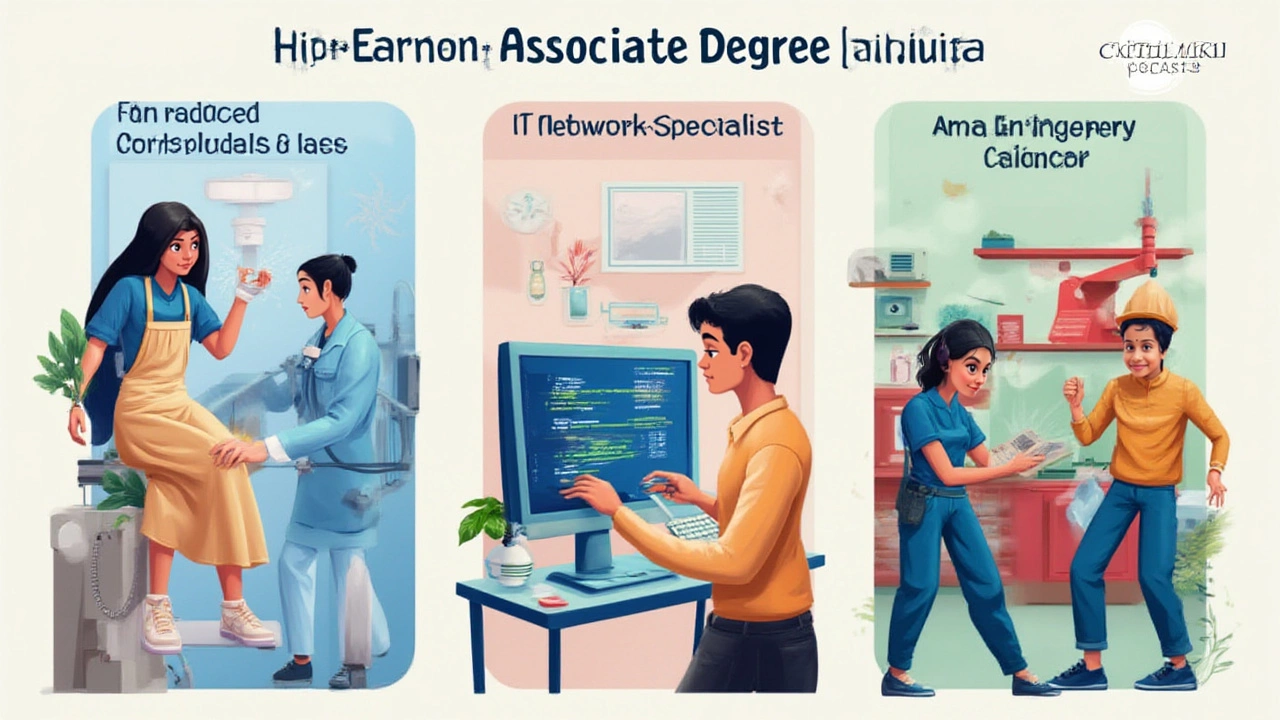
Here’s a wild fact you probably didn’t expect: some people with only a 2-year degree often out-earn their friends who slogged through four years of university and tacked on student debt to boot. That sound a bit controversial? Sure, but it's totally true—and if you’re the practical type who wants a great paycheck without spending years buried in textbooks, this is the sort of knowledge that really matters.
The Money Makers: Which 2-Year Degrees Pay the Most?
Not all associate degrees are created equal. If you picture two people at your local café, one with an associate in art history and the other with an associate in radiologic technology, there’s a big difference in their likely bank balances. The medical field, for starters, is flooded with 2-year degree holders who are making some serious cash—think registered nurses, dental hygienists, and radiology techs. In the UK and US, a registered nurse with an associate degree typically pulls in between £29,000 and £54,000 (or $60,000 if you cross the pond). Some go even higher depending on region and overtime hours.
Dental hygienists are another hidden gem. After just a 2-year course and passing a national exam, they often find themselves earning upwards of £36,000 to £55,000 (and again, $80,000+ in some US cities). The work isn’t easy—you’re keeping gums healthy and teeth sparkling—but the pay reflects the demand. Then there’s the field of diagnostic medical sonography. Many people don’t even know what a 'sonographer' is, but after a 2-year qualification, it’s common to see salaries around the £40,000-£60,000 mark, especially in big NHS trusts or private clinics.
If tech is more your speed, you can’t ignore the powerhouse of computer and IT associate degrees. Network administrators and support specialists often need only a 2-year qualification to get their foot in the door, and entry-level jobs can start around £28,000 and reach well into the £45,000s within a few years, especially with a few certifications under your belt. Don’t overlook engineering technology either – electrical and mechanical engineering techs enjoy similar pay scales to nurses, along with a shortage of workers, meaning job stability and salary negotiations swing in your favour.
| Career | Average UK Salary (£) | Highest UK Salary (£) | Typical Degree |
|---|---|---|---|
| Registered Nurse | 36,000 | 54,000+ | Associate Degree in Nursing |
| Dental Hygienist | 40,000 | 55,000+ | Associate in Dental Hygiene |
| Radiology Technologist | 34,000 | 52,000+ | Associate in Radiologic Technology |
| Diagnostic Medical Sonographer | 42,000 | 60,000+ | Associate in Sonography |
| Network Administrator | 32,000 | 45,000+ | Associate in Computer Networking |
| Engineering Technician | 32,000 | 50,000+ | Associate in Engineering Tech |
Healthcare and tech are hard to beat for paychecks, and these fields often come with strong future growth, meaning the demand for these skills isn’t drying up any time soon. Plus, many employers will even pay for you to upgrade your skills once you’re in, leading to promotions without going back to university for years.

How Do These High-Paying 2-Year Degrees Lead to Big Salaries?
Here’s where it gets practical. Big salaries don’t just fall into your lap; you need the right mix of skills, industry demand, and a little bit of hustle. If you pick a two-year program that’s plugged straight into an industry with a worker shortage, you fix the supply-and-demand issue — on your own terms. For example, in the NHS as of 2025, around 40,000 nurse posts remain unfilled, and private dental clinics are often crying out for skilled hygienists. This means new graduates are snapped up fast, and with overtime or extra shifts, regular nurses can find themselves cracking the £50k mark, something teachers or business grads might not see for years.
The medical and tech world also comes with lots of on-the-job training and certifications. For instance, after qualifying as a radiographer or sonographer, many workplaces offer extra courses, like MRI or CT training, which lead to even juicier salaries. This upskilling, even if it takes only a few months, boosts your pay without keeping you out of the workforce.
Tech companies often look at practical skills and certifications rather than a big list of degrees, so if you can land that first IT support position, it’s often just a matter of doing the CompTIA, Cisco, or Microsoft certs after you start. One Bristol mate of mine started as a support technician after a 2-year course and is now managing servers for a fintech firm—pulling in £60,000 a year and working remote half the week. Skills + scrappiness often trumps theory and a big certificate on the wall.
Another hack is the apprentice or work-study route. In the UK, healthcare trusts, engineering firms, and even gaming companies offer paid apprenticeships linked to a 2-year degree program. You get paid as you learn (sometimes £18k-£25k right out the gate) and walk into a real job when you finish. Honestly, you spend less than your mates at uni, skip out on the pizza-and-pasta-for-every-meal student poverty phase, and can actually save money in your early twenties.
Here are some practical steps if you want to make the most after your associate degree:
- Look for degrees connected to careers on the 'Shortage Occupation List'—especially healthcare or engineering-related roles.
- As soon as you graduate, stack certifications (especially in tech) or take specialized training for high-demand skills.
- Jump on overtime or weekend shifts when starting jobs (not glamorous, but the pay grows fast, especially in nursing and dental work).
- Network with employers during your work placement or apprenticeship. Jobs often get filled before they hit public listings.
- If you score a job with a big company, ask about ongoing professional development—they often pay for upskilling that bumps up your salary.
Quick tip: Don’t just stare at average salary stats. Find out what the top performers in your field do—specializations, locations, even side hustles. That’s where the real earning potential hides.

What’s the Catch? Risks and Realities Behind High-Paying Associate Degrees
No story is ever all sunshine and pay raises. Want to earn the best salaries with a 2-year degree? You’ll have to navigate a few challenges. First up, competition for top courses can be fierce, especially for programs in popular NHS hospitals or cutting-edge tech colleges. That means it’s crucial to put together a solid application, snag work experience early, and maybe get a stellar recommendation letter or two.
Demand also shifts. Dental hygiene and medical imaging jobs are hot now, but markets can change, especially if a location suddenly fills the workforce gap. That’s why being open to relocating—to London, Manchester, or even out of the UK—is sometimes key to scoring the big payslips. Location really matters. Someone working as a dental hygienist in Bristol will often make less than their cousin in London, but cost-of-living can balance out the numbers.
Burnout is another major risk, especially in healthcare. Nursing and dental hygiene pay well, but the jobs can be physically and emotionally tough. Long shifts, weekend work, and sometimes harsh working environments are real factors. You need to be sure the money is worth the grind—so if you’re the type who can’t stand the idea of bodily fluids or grumpy patients, maybe look at engineering tech or IT instead.
Let’s talk about training costs and debt. While 2-year degrees usually save you heaps compared to university, some involve upfront fees or equipment costs. But here’s a trick: the government and many charities offer grants for people training in shortage jobs. If you dig around, you’ll often find hidden scholarships—especially if you come from an underrepresented background or are willing to work in a rural area after graduation.
Employability also isn’t equal across all associate-level jobs. For every dental hygienist making big money, there’s someone with a 2-year creative arts diploma struggling to land a gig. That’s why it pays (literally) to follow the stats, not just passion. Follow your interests inside high-demand fields, like focusing on IT security instead of generic computer support, or specializing in ultrasound for high-risk pregnancies rather than general sonography.
Finally, here’s the bit few people say out loud: salary ceilings do exist. Most two-year degree roles top out at a certain level unless you keep climbing through further qualifications or managerial roles. After a few years, some professionals decide to carry on and earn a higher-level degree part-time, supported by their employers, and break through the salary gap that way.
highest paying 2 year degrees don’t magically guarantee an easy life—but if you choose smartly, keep pushing your skills, and grab every opportunity for upskilling or sidestepping into specialist paths, you can pull in an income that beats plenty of bachelor’s degree holders.
Don’t worry if you missed the university train. There’s a whole world of practical, good-paying jobs built for smart, focused people who just want to get ahead. With the right 2-year qualification, you can find yourself out-earning your old school friends in less time than it takes them to finish their dissertations.
